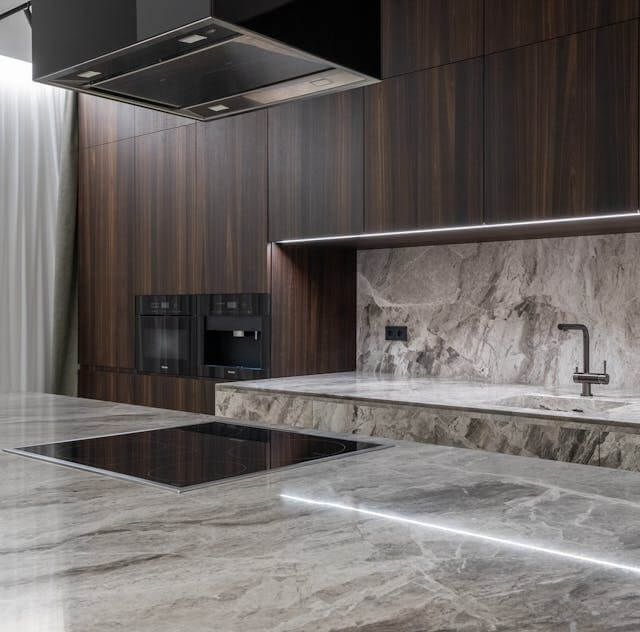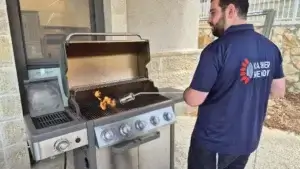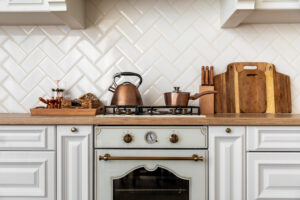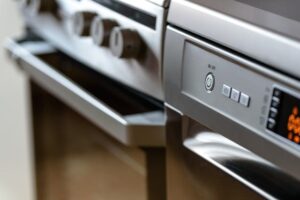When moving into a new home or deciding to make a non-kosher kitchen kosher, one of the major challenges is kosherizing the kitchen countertop. This article explains how to kosher different types of countertops and details the various halachic (Jewish legal) methods used.
Why is Kosherization Necessary?
Kitchen countertops come into direct contact with hot food and non-kosher ingredients. According to Jewish law, surfaces absorb the taste of foods they come into contact with, especially when hot. Therefore, proper kosherization is required before using the countertop for kosher food preparation.
Types of Countertops and Their Kosherization
Natural Stone (Granite, Marble)
1. Characteristics:
– Made from natural, porous material
– Relatively heat-resistant
– Absorbs liquids and fats
2. Kosherization Process:
– Thorough cleaning with strong cleaning agents
– Waiting period of 24 hours
– Pouring boiling water over the entire surface (hagalah)
– Using a heated stone (called an “even melubenet”) on the boiling water
Quartz (Caesarstone)
1. Characteristics:
– A synthetic material made of 93% natural quartz
– Less porous than natural stone
– Highly resistant to heat and stains
2. Kosherization Process:
– Thorough cleaning
– 24-hour waiting period
– Pouring boiling water over the surface
– Lenient opinion: Boiling water alone suffices
– Stringent opinion: Requires a heated stone in addition
Stainless Steel
1. Characteristics:
– Completely non-porous material
– Highly heat-resistant
– Relatively easy to kosherize
2. Kosherization Process:
– Thorough cleaning
– 24-hour waiting period
– Pouring boiling water over the entire surface
Halachic Methods of Kosherization
Method 1: Boiling Water (Hagalah)
• Pouring boiling water over the countertop
• Advantage: Simple and widely accepted
• Best for: Surfaces not exposed to direct flame or extreme heat
Method 2: Light Blowtorching (Libun Kal)
• Using a heated stone in addition to boiling water
• More stringent
• Recommended for most stone countertops
Method 3: Permanent Covering
• For the strictest opinions
• Covering the countertop with aluminum foil or another material
• Best for: Cases where kosherization is uncertain
Practical Kosherization Guide
Preparation Stage
1. Thorough Cleaning:
– Using strong detergents
– Removing all food residues
– Special attention to joints and seams
2. Waiting Period:
– 24 hours without use
– Ensuring the surface is completely dry
Kosherization Process
1. Boiling Water Preparation:
– Boiling water in an electric kettle
– Using multiple kettles for efficiency
2. Pouring the Water:
– Pouring continuously over the entire surface
– Ensuring all areas are covered
– Confirming the water remains hot
3. Using a Heated Stone (if required):
– Heating the stone until it is red-hot
– Pressing it over the boiling water
Important Tips for Success
1. Planning Ahead:
– Gathering all necessary equipment
– Choosing a time without interruptions
2. Safety Precautions:
– Wearing protective gloves
– Handling boiling water carefully
– Ensuring good kitchen ventilation
3. After Kosherization:
– Immediate drying of the surface
– Brief waiting period before use
– Marking the surface as kosher
Additional Solutions
Temporary Covering
• Using thick aluminum foil
• Regular replacement
• Ideal for short-term solutions
Portable Surfaces
• Purchasing separate workboards
• Using cutting boards for food prep
• A flexible and convenient solution
Conclusion
Kosherizing a kitchen countertop is a crucial step in making a non-kosher kitchen kosher. It is essential to follow the correct procedures and consult a qualified rabbi for specific cases.
Important Note
The information in this article is general. It is crucial to consult a rabbi regarding your specific case, especially if you have a unique countertop material or particular concerns about the kosherization process.
Nachman Harris. Kosher Expert.
Available for any of your questions






